小学英语句型句式
- 格式:doc
- 大小:115.50 KB
- 文档页数:17
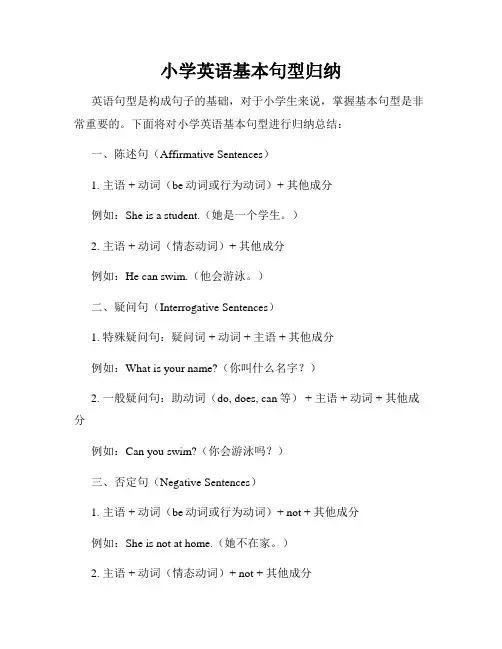
小学英语基本句型归纳英语句型是构成句子的基础,对于小学生来说,掌握基本句型是非常重要的。
下面将对小学英语基本句型进行归纳总结:一、陈述句(Affirmative Sentences)1. 主语 + 动词(be动词或行为动词)+ 其他成分例如:She is a student.(她是一个学生。
)2. 主语 + 动词(情态动词)+ 其他成分例如:He can swim.(他会游泳。
)二、疑问句(Interrogative Sentences)1. 特殊疑问句:疑问词 + 动词 + 主语 + 其他成分例如:What is your name?(你叫什么名字?)2. 一般疑问句:助动词(do, does, can等) + 主语 + 动词 + 其他成分例如:Can you swim?(你会游泳吗?)三、否定句(Negative Sentences)1. 主语 + 动词(be动词或行为动词)+ not + 其他成分例如:She is not at home.(她不在家。
)2. 主语 + 动词(情态动词)+ not + 其他成分例如:He cannot swim.(他不能游泳。
)四、祈使句(Imperative Sentences)1. 动词原形 + 其他成分例如:Sit down.(坐下。
)2. Let's + 动词原形 + 其他成分例如:Let's play together.(让我们一起玩。
)五、感叹句(Exclamatory Sentences)1. How + 形容词/副词 + 主语 + 动词例如:How beautiful the flowers are!(花儿多漂亮啊!)2. What + a/an + 形容词 + 可数名词单数 + 主语 + 动词例如:What a lovely puppy it is!(多可爱的小狗啊!)以上是关于小学英语基本句型的归纳总结,希望对学习英语的同学有所帮助。

小学英语句型结构大全英语句型(Sentence Structure)是指英语中句子的基本结构和组成方式。
掌握不同的句型结构对于学习英语语法和提高英语交流能力非常重要。
在小学英语学习中,学生通常会学习一些简单的句型结构,下面将详细介绍一些常见的小学英语句型结构。
1. 主语 + 动词这是最简单的句型结构。
主语是句子的核心,而动词描述了主语的动作或状态。
例句:I play football.2. 主语 + 动词 + 宾语这个句型结构用来表示主语对宾语进行了某种动作。
例句:My mother reads a book.3. 主语 + 动词 + 地点这个句型结构用来表示主语在某个地方进行某种活动。
例句:He plays basketball at the park.4. 主语 + 动词 + 时间这个句型结构用来表示主语在某个时间进行某种活动。
例句:We have English class on Monday.5. 主语 + 动词 + 方式这个句型结构用来表示主语以某种方式进行某种活动。
例句:They swim fast.6. 主语 + 动词 + 宾语 + 地点这个句型结构用来表示主语在某个地方对宾语进行了某种动作。
例句:She cleans her room at home.7. 主语 + 动词 + 宾语 + 时间这个句型结构用来表示主语在某个时间对宾语进行了某种动作。
例句:He finishes his homework after school.8. 主语 + 动词 + 宾语 + 方式这个句型结构用来表示主语以某种方式对宾语进行了某种动作。
例句:We eat dinner with chopsticks.9. 主语 + 动词 + 宾语 + 地点 + 时间这个句型结构用来表示主语在某个地方、某个时间对宾语进行了某种动作。
例句:They watch movies at the cinema on weekends.10. 主语 + 动词 + 宾语 + 地点 + 方式这个句型结构用来表示主语在某个地方以某种方式对宾语进行了某种动作。
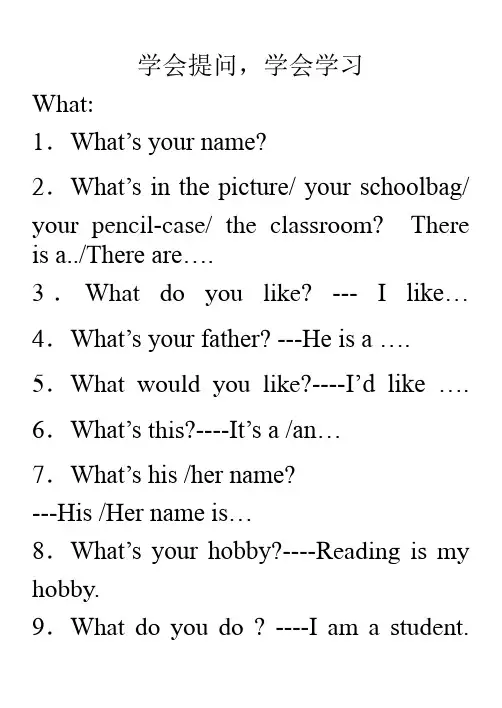
学会提问,学会学习What:1.What’s your name?2.What’s in the picture/ your schoolbag/ your pencil-case/ the classroom? There is a../There are….3.What do you like? --- I like…4.What’s your father? ---He is a …. 5.What would you like?----I’d like …. 6.What’s this?----It’s a /an…7.What’s his /her name?---His /Her name is…8.What’s your hobby?----Reading is my hobby.9.What do you do ? ----I am a student.What does he /she/your mother/father do? ---He /She is a …What do you do on the weekend?—I usually/often/sometimes climb mountains. 10.What time is it?----It’s …11. What can you do ?–---I can clean the room.12.What colour is it?It’s red/yellow/blue/orange/brown/black/white 13.What are they?---They are … 14.What are you doing?――They are rea ding.15.What’s the weather like in Beijing?—It’s sunny/cloudy/windy/rainy/snowy. 16.What size?—size 2317.What’s your favourite season?---I like spring/summer/fall/winter.18.What’s the weather like in spring?—It’s warm and sunny.19.What would you like to do/eat?---I’d like some meat.20.What’s the date today?---It’s March.1.201121.What are they?---They are…22.What’s she doing?---She is running. 23.What are they doing?—They are running.24.What is it doing?---It is eating. 25.What are the ducks doing?—They are swimming.26.What do you have?----I have English, Chinese and math.27.What are you reading?----They are reading story-books. 28.What’s that?-----It’s a /an…29.What do you want to do?----I want to go shopping.30.What’s he/she/it like?—He/She is tall/short/quiet/active/smart/strong/thin/kin d.31.What day is it today?---It’s Monday /Tuesday/Wednesday/Thursday/Thursday/ Friday/Satuday/Sunday32.What do you have on Thursday?---We have English, Chinese and Math. 33.What do you do on weekends?---I usually do my homework/watch TV/Clean my room…34.What’s your favourite day/food/fruit? ----I like….35.What can you /he /she /it do?----She /He can go ….36. What are you going to do on the weekend?—I am going to ….37.What are you going to buy?----I am going to buy…38.What are you going to be?---I am going to be a teacher.39.What did you buy?----I bought a pair of slippers.40.What should we do then?---We should …41. What’s your hobby?---I like collecting stamps.42. What’s the matter?---I have a headache/earache/sore ache.My nose hurts.43.What did you do last weekend?---I played football….How1.How are you?2. How about you?3. How old are you?4. How many candles balloons /books /gifts are there?----There are 3.5.How do you go to school /Canada?---I go to school by bike.6. How can I get to Zhongshan Park /the zoo?----You can take No.1 bus.7. How do you go there?---I go there on foot.8. How does he/she go to school/ work?---He/She goes to school by bus.9. How do you plant flowers?----Put the seed in the soil…10. How tall /old/heavy are you?----I am…11. How does the water become vapour?12. How big are your feet?13.How long are your legs?14.How large is your room?15.How long is your bed?16.How many students are there in your class?---There are 60 students.17.How much is it/are they?18.How does Amy feel?Where1. Where is my seat/the trash bin/ your pen?---It’s on/in /under/near/in front of /behin d the …2.Where are the keys/ my shoes/ they?---They are at home./in the classroom.3.Where is your home /hospital/ cinema/ bookstore /library/ museum /shoe store?–It’s near the school.4. Where do you live?—I live in China.5.Where does he work?---He works at school.6.Where is the canteen/library/ art room? ----It’s on the first floor.8.Where are you from?—I am from China.9.Where is your mouth?---Here it is.10.Where does the rain/cloud /vapour/ flower come from?----It comes from…11. Where did you go on your holiday?---I went to a park….When and who1. When do you get up/ go to school/have English class/have lunch/play sports/have dinner?2. Who’s your friend/principal/he?3. Who’s your math teacher?下面是一般疑问句1.Is she in the study? Yes, she is/No, she isn’t.2.Is there a cinema near here?---Yes, there is./No, there isn’t.3. Is it far from school?—Yes, it is.4. Is your pen pal a boy or a girl?—Yes, it is. /No, it isn’t.5. Is this the library/TV room/teacher’s desk /your bedroom/ your aunt?—Yes, it is./No, i t isn’t.6. Is that a picture?—Yes, it is./No, it isn’t.7. Is your birthday in February?---- Yes, it is./No, it isn’t.8.Is he watching ants?----Yes, he is./No, he isn’t. 9. Is she your sister?--- Yes, she is/No, she isn’t.10.Is she/he young/kind/strict/active/quiet/old? ---Yes, she is/No, she isn’t.10.Are they nice/ sheep/ all right?—Yes, they are./No, they aren’t.11.Are those cucumbers? —Yes, they are./No, they aren’t.12. Are you under the table? ---Yes, I am . /No, I am not.13.Are you helpful at home?---Yes, I am . /No, I am not.14. Are there any bridges in your village?---Yes, there are. /No, there aren’t.1. Can I have some chicken/ a Coke?---Yes, please. /Sorry, you can’t.2. Can I go on foot?---- Yes, please. /Sorry, you can’t.3. Can you go by ship or train?---- Yes, I can . /No, I can't.4. Can he go with us?—Yes, he can. /No, he can’t.5. Can you help me go up to the sky?—Sorry, I can’t.6. Can I have a try?-- Yes, please.7. Can I wear my T-shirt?--- Yes, please. /Sorry, yo u can’t. It’s cold.8. Can I help you?9. Can I ask your some questions?----Sure.10. Can tigers swim?---Yes, it can.11. Can you read this/play football/do housework?----Yes, I can .12. Can I have an apple, please?----Sure, here you are.1. Do you like sports/ pears/apples?----Yes,I do./No, I don’t.2. Do you know the traffic rules? ----Yes, I do./No, I don’t.3. Do you have a comic book/ a library/any new teachers ? ----Yes, I do./No, I don’t.4. Do you have lunch at school? ----Yes, I do./No, I don’t.5. Do you want to be my friend? ----Yes, I do./No, I don’t.6. Does he go to school by car?----Yes, he does./No, he doesn’t.7. Does he live n the country? ----Yes, he does./No, he doesn’t.8. Does she teach English? ----Yes, she does./No, she doesn’t.9. Does she have a computer? ----Yes, she does./No, she doesn’t.上述共110个句子。
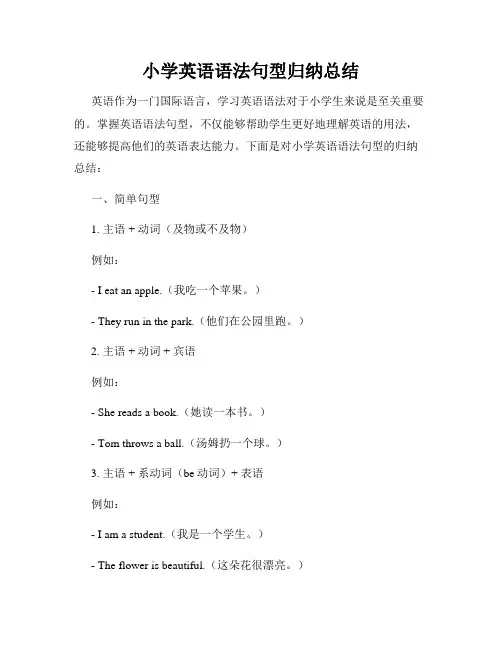
小学英语语法句型归纳总结英语作为一门国际语言,学习英语语法对于小学生来说是至关重要的。
掌握英语语法句型,不仅能够帮助学生更好地理解英语的用法,还能够提高他们的英语表达能力。
下面是对小学英语语法句型的归纳总结:一、简单句型1. 主语 + 动词(及物或不及物)例如:- I eat an apple.(我吃一个苹果。
)- They run in the park.(他们在公园里跑。
)2. 主语 + 动词 + 宾语例如:- She reads a book.(她读一本书。
)- Tom throws a ball.(汤姆扔一个球。
)3. 主语 + 系动词(be动词)+ 表语例如:- I am a student.(我是一个学生。
)- The flower is beautiful.(这朵花很漂亮。
)4. 主语 + 系动词(be动词)+ 地点例如:- The book is on the table.(书在桌子上。
)- The cat is under the chair.(猫在椅子下面。
)二、疑问句1. 一般疑问句使用助动词do、does或did加在句子的主语前,然后再加上动词原形。
例如:- Do you like ice cream?(你喜欢冰淇淋吗?)- Does he play basketball?(他打篮球吗?)2. 特殊疑问句特殊疑问句是用来询问特定信息或细节的问句,通常以疑问代词开头。
例如:- What is your name?(你叫什么名字?)- When is your birthday?(你的生日是什么时候?)- Where do you live?(你住在哪里?)在句子前面加上否定词,通常为don't、doesn't或didn't。
例如:- I don't like pizza.(我不喜欢披萨。
)- He doesn't have a pet.(他没有宠物。
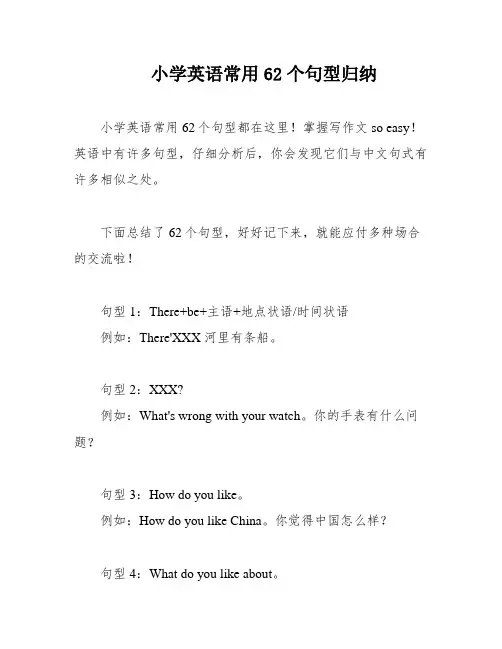
小学英语常用62个句型归纳小学英语常用62个句型都在这里!掌握写作文so easy!英语中有许多句型,仔细分析后,你会发现它们与中文句式有许多相似之处。
下面总结了62个句型,好好记下来,就能应付多种场合的交流啦!句型1:There+be+主语+地点状语/时间状语例如:There'XXX 河里有条船。
句型2:XXX?例如:What's wrong with your watch。
你的手表有什么问题?句型3:How do you like。
例如:How do you like China。
你觉得中国怎么样?句型4:What do you like about。
例如:What do you like about China。
你喜欢中国的什么?句型5:had better(not)+动词原形例如:You'd better ask that policeman over there。
你最好去问问那边的警察。
句型6:How+adj。
/ adv。
+主语+谓语!What a/ an+adj。
+n。
+主语+谓语!例如:How cold it is today。
今天多冷啊!What a fine picture it is。
多美的一幅画啊!句型7:Thank+sb。
+for(doing)sth.例如:Thank you for coming to see me。
感谢你来看我。
句型8:So+be/情态动词/助动词+主语例如:He is a student。
So am I。
他是学生,我也是。
句型9.not。
until。
例如:XXX。
直到他的父母回来他才吃饭。
句型10:比较级+and+比较级例如:XXX XXX。
那孩子哭得越来越厉害。
句型11:the +比较级,the +比较级例如:The more one has,the more one wants。
越有越贪。
Art and music are two different forms of n.艺术和音乐是两种不同的表达形式。
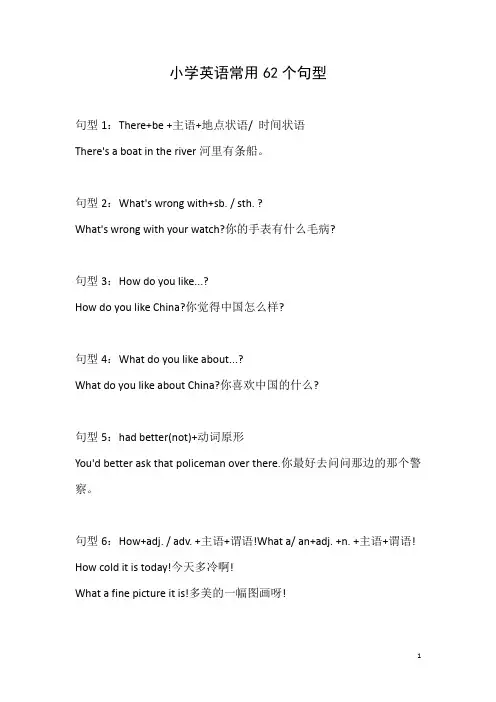
小学英语常用62个句型句型1:There+be +主语+地点状语/ 时间状语There's a boat in the river河里有条船。
句型2:What's wrong with+sb. / sth. ?What's wrong with your watch?你的手表有什么毛病?句型3:How do you like...?How do you like China?你觉得中国怎么样?句型4:What do you like about...?What do you like about China?你喜欢中国的什么?句型5:had better(not)+动词原形You'd better ask that policeman over there.你最好去问问那边的那个警察。
句型6:How+adj. / adv. +主语+谓语!What a/ an+adj. +n. +主语+谓语! How cold it is today!今天多冷啊!What a fine picture it is!多美的一幅图画呀!句型7:Thank+sb. +for(doing)sth.Thank you for coming to see me.感谢你来看我。
句型8:So+be/ 情态动词/ 助动词+主语He is a student. So am I.他是一个学生,我也是。
句型9:... not ... until ...He didn't have supper until his parents came back.直到他的父母回来他才吃饭。
句型10:比较级+and+比较级The baby cried harder and harder.那孩子哭得越来越厉害。
句型11:the +比较级,the +比较级The more one has,the more one wants.越有越贪。
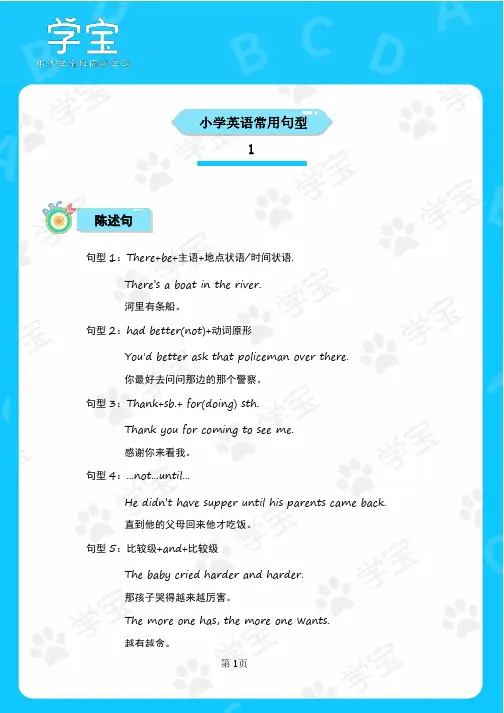
小学英语常用句型1陈述句句型1:There+be+主语+地点状语/时间状语.There’s a boat in the river.河里有条船。
句型2:had better(not)+动词原形You'd better ask that policeman over there.你最好去问问那边的那个警察。
句型3:Thank+sb.+for(doing)sth.Thank you for coming to see me.感谢你来看我。
句型4:...not...until...He didn’t have supper until his parents came back.直到他的父母回来他才吃饭。
句型5:比较级+and+比较级The baby cried harder and harder.那孩子哭得越来越厉害。
The more one has,the more one wants.越有越贪。
Last Sunday the weather was not so wet as it is today.上个星期天的天气不像今天的天气潮湿。
句型7:more/less+adj.+than...I think art is less important than music.我认为艺术不如音乐重要。
句型8:stop sth.from doing sth.The Great Green Wall will stop the wind from blowing the earth away.绿色长城将阻挡风吹走土壤。
句型9:both...and...Both you and I are students.我和你都是学生。
句型10:either...or...Either you or he is wrong.不是你错就是他错。
句型11:neither...nor...Neither he nor I am a student.我和他都不是学生。
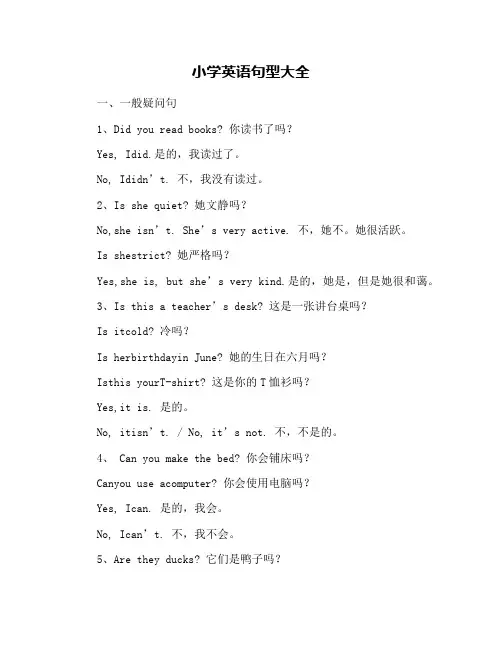
小学英语句型大全一、一般疑问句1、Did you read books? 你读书了吗?Yes, Idid.是的,我读过了。
No, Ididn’t. 不,我没有读过。
2、Is she quiet? 她文静吗?No,she isn’t. She’s very active. 不,她不。
她很活跃。
Is shestrict? 她严格吗?Yes,she is, but she’s very kind.是的,她是,但是她很和蔼。
3、Is this a teacher’s desk? 这是一张讲台桌吗?Is itcold? 冷吗?Is herbirthdayin June? 她的生日在六月吗?Isthis yourT-shirt? 这是你的T恤衫吗?Yes,it is. 是的。
No, itisn’t. / No, it’s not. 不,不是的。
4、 Can you make the bed? 你会铺床吗?Canyou use acomputer? 你会使用电脑吗?Yes, Ican. 是的,我会。
No, Ican’t. 不,我不会。
5、Are they ducks? 它们是鸭子吗?Arethey eatingthe honey? 它们吃蜂蜜吗?Yes,they are. 是的,它们是。
No,they aren’t. 不,它们不是。
6、Is there a forest in the park? 公园里有一个森林吗?Isthere a river? 那里有条河吗?Yes,there is. 是的,那里有。
No,there aren’t. 不,那里没有。
7、Are there any pandas in the mountains? 山里有一些熊猫吗?Arethere anyfish in the rivers? 河里有一些鱼吗?Yes,there are. 是的,那里有。
No,there aren’t. 不,那里没有。
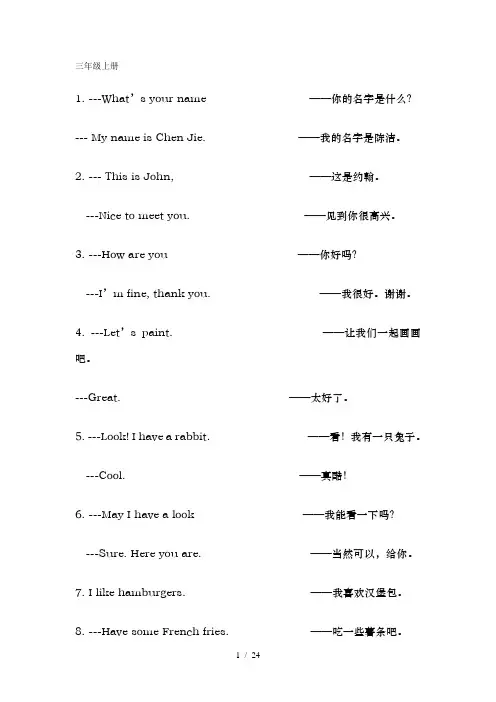
三年级上册1. ---What’s your name ——你的名字是什么?--- My name is Chen Jie. ——我的名字是陈洁。
2. --- This is John, ——这是约翰。
---Nice to meet you. ——见到你很高兴。
3. ---How are you ——你好吗?---I’m fine, thank you. ——我很好。
谢谢。
4. ---Let’s paint. ——让我们一起画画吧。
---Great. ——太好了。
5. ---Look! I have a rabbit. ——看!我有一只兔子。
---Cool. ——真酷!6. ---May I have a look ——我能看一下吗?---Sure. Here you are. ——当然可以,给你。
7. I like hamburgers. ——我喜欢汉堡包。
8. ---Have some French fries. ——吃一些薯条吧。
---Thank you. ——谢谢。
9. ---Can I have some chicken ——我可以吃一些鸡肉吗?--- Sure. Here you are. ——当然可以,给你。
10. ---How old are you ——你几岁了?---I’m 9. ——我9岁。
11. ---How many balloons ——有多少只气球?---4. ——4只。
三年级下册1. ---Where are you from ——你来自哪里?--- I’m from America. ——我来自美国。
2. --- Who’s that woman ——那位女士是谁?---She’s my mother. ——她是我的妈妈。
3. --- Who’s that man ——那位男士是谁?---He’s my father. ——他是我的爸爸。
4. ---How many kites can you see ——你能看见多少只风筝?---I can see 12 ——我能看见12只。
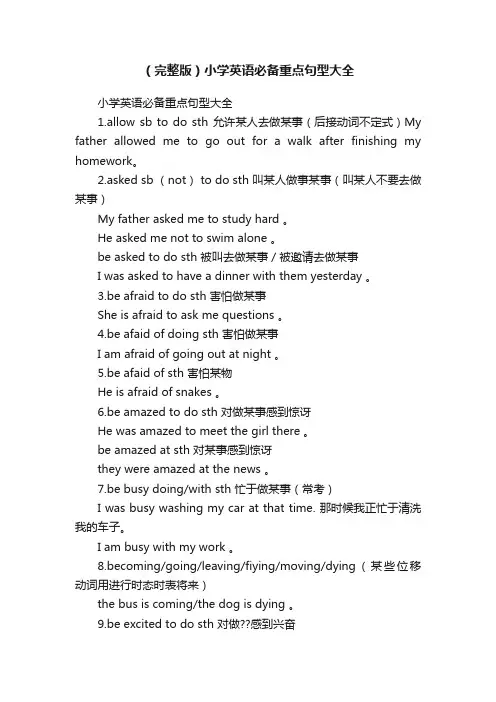
(完整版)小学英语必备重点句型大全小学英语必备重点句型大全1.allow sb to do sth 允许某人去做某事(后接动词不定式)My father allowed me to go out for a walk after finishing my homework。
2.asked sb (not) to do sth 叫某人做事某事(叫某人不要去做某事)My father asked me to study hard 。
He asked me not to swim alone 。
be asked to do sth 被叫去做某事 / 被邀请去做某事I was asked to have a dinner with them yesterday 。
3.be afraid to do sth 害怕做某事She is afraid to ask me questions 。
4.be afaid of doing sth 害怕做某事I am afraid of going out at night 。
5.be afaid of sth 害怕某物He is afraid of snakes 。
6.be amazed to do sth 对做某事感到惊讶He was amazed to meet the girl there 。
be amazed at sth 对某事感到惊讶they were amazed at the news 。
7.be busy doing/with sth 忙于做某事(常考)I was busy washing my car at that time. 那时候我正忙于清洗我的车子。
I am busy with my work 。
8.becoming/going/leaving/fiying/moving/dying(某些位移动词用进行时态时表将来)the bus is coming/the dog is dying 。
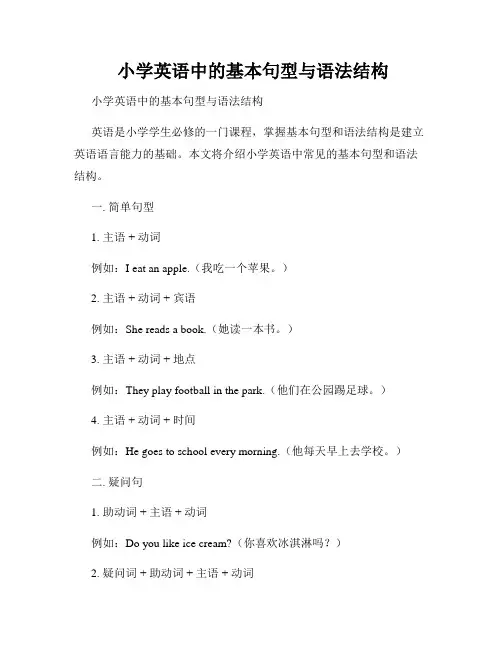
小学英语中的基本句型与语法结构小学英语中的基本句型与语法结构英语是小学学生必修的一门课程,掌握基本句型和语法结构是建立英语语言能力的基础。
本文将介绍小学英语中常见的基本句型和语法结构。
一. 简单句型1. 主语 + 动词例如:I eat an apple.(我吃一个苹果。
)2. 主语 + 动词 + 宾语例如:She reads a book.(她读一本书。
)3. 主语 + 动词 + 地点例如:They play football in the park.(他们在公园踢足球。
)4. 主语 + 动词 + 时间例如:He goes to school every morning.(他每天早上去学校。
)二. 疑问句1. 助动词 + 主语 + 动词例如:Do you like ice cream?(你喜欢冰淇淋吗?)2. 疑问词 + 助动词 + 主语 + 动词例如:What do you do on weekends?(你周末做什么?)3. 特殊疑问句(疑问词 + 助动词 + 主语 + 动词)例如:Where did you go last summer?(你去哪里过去暑假?)三. 否定句1. 主语 + 助动词 + not + 动词例如:He does not like carrots.(他不喜欢胡萝卜。
)2. 主语 + do/does not + 动词例如:I do not play tennis.(我不打网球。
)四. 复合句1. 主从句主从句结构由一个主句和一个或多个从句组成。
从句可以是名词从句、形容词从句或副词从句。
例如:I know that she is a teacher.(我知道她是一名老师。
)I like the book which is on the table.(我喜欢桌上的那本书。
)2. 并列句并列句由两个或多个主句组成,它们之间用逗号或连词连接。
例如:I like apples, but my sister likes oranges.(我喜欢苹果,但是我妹妹喜欢橙子。
小学英语语法句型构成及变化1、be动词的变化。
肯定句:主语+be(am,is,are)+其它。
如:I am a boy、我是一个男孩。
否定句:主语+ be + not +其它。
如:He is not a worker、他不是工人。
一般疑问句:Be +主语+其它。
如:-Are you a student? -Yes、 I am、 / No, Im not、特殊疑问句:疑问词+一般疑问句。
如:Where is my bike?2、行为动词的变化。
(1)当主语为第一,二人称及复数时,助动词为do肯定句:主语+动词原形(+其它)。
如:We often play basketball after school、否定句:主语+ dont+动词原形(+其它)。
如:we don’t play basketball after school、一般疑问句:Do +主语+动词原形+其它? 如:Do you often play basketball after school l? Yes, we do、 / No, we dont、特殊疑问句:疑问词+以do开头的一般疑问句? 如:What do you often do after school ?(2)当主语为第三人称单数时 ,助动词为does肯定句:主语+动词三单式(+其它)。
如:He swims well、否定句:主语+ doesn’t+动词原形(+其它)。
如:He doesn’t swim well、、一般疑问句:Does +主语+动词原形+其它。
如:Does he swim well ? Yes, he does、 / No, he doesnt、特殊疑问句:疑问词+以does开头的一般疑问句?如:How does your father go to work?三、第三人称单数的动词变化规则(只有在第三人称为主语的肯定句中,动词才用三单式)(1)多数动词直接加s:runs gets likes collets takes plays climbs……、(2)结尾是s, x, sh, ch, o,前为辅音字母,结尾加es :watches teaches goes does washes crosses mixes brushes(3)动词末尾y前为辅音:将y改为i加es:study→studies fly→flies carry→carries cry→cries但在y前如果为元音则直接加s:buys says四、时间标志:always , usually , often , sometimes ,every… 现在进行时一、意义当表示现在正在进行的动作或正在发生的事。
小学常用英语语法句型汇总一、名词句型1. 主语 + 动词 + 名词例句:The girl is playing soccer.翻译:这个女孩正在踢足球。
2. 主语 + be动词 + 名词例句:I am a student.翻译:我是一个学生。
3. 主语 + be动词 + 形容词例句:She is happy.翻译:她很开心。
4. 主语 + have + 名词例句:They have a dog.翻译:他们有一只狗。
5. 主语 + have + 可数名词复数例句:We have two apples.翻译:我们有两个苹果。
6. 主语 + have + 不可数名词例句:He has some milk.翻译:他有一些牛奶。
7. 主语 + have + 可数名词复数 + 名词例句:They have two books.翻译:他们有两本书。
二、动词句型1. 主语 + 动词原形 + 其他成分例句:He plays basketball every day.翻译:他每天打篮球。
2. 主语 + 动词原形 + 名词例句:We watch movies on weekends.翻译:我们周末看电影。
3. 主语 + 动词原形 + 副词例句:She runs fast.翻译:她跑得很快。
4. 主语 + 动词原形 + 不定式例句:I want to eat ice cream.翻译:我想吃冰淇淋。
5. 主语 + 动词原形 + 助动词例句:He can swim.翻译:他会游泳。
三、形容词句型1. 主语 + be动词 + 形容词例句:The weather is sunny.翻译:天气晴朗。
2. 主语 + be动词 + 形容词 + 名词例句:Her dress is beautiful.翻译:她的连衣裙很漂亮。
3. 主语 + be动词 + 形容词 + 不定式例句:The movie is interesting to watch. 翻译:这部电影很有趣。
小学英语句型整理归纳总结英语是小学阶段的重要学科之一,学好英语需要掌握一定的句型。
下面对一些常用的英语句型进行整理归纳总结,帮助小学生更好地学习和运用。
1. 主语+动词+宾语(S+V+O)这是最基本的英语句型,也是表达最简单的句子结构。
通过主语+动词+宾语的句型,我们可以描述一个人或事物的动作或状态。
例句:I read a book.(我读一本书。
)2. 主语+动词+间接宾语+直接宾语(S+V+IO+DO)这个句型是在基本句型的基础上加了间接宾语,用于描述将某物或某人给予给另外的人或物。
例句:My mother gave me a gift.(我的妈妈给了我一个礼物。
)3. 主语+系动词+表语(S+LV+PA)系动词用来连接主语和表语,表达主语的状态或性质。
常见的系动词有be动词(is, am, are)和感官动词(look, smell, taste等)。
例句:She is happy.(她很开心。
)4. 主语+系动词+表语+宾语(S+LV+PA+OC)在系动词后面加一个宾语,用来进一步描述主语的状态,常用于描述主语的感觉或看法。
例句:He painted the wall red.(他把墙涂成了红色。
)5. There be句型在“There be”句型中,be动词后面放置一个名词或代词,用来表示某处有某物或某人。
例句:There is a cat in the garden.(花园里有一只猫。
)6. 祈使句(Imperative Sentences)祈使句用来表示请求、建议或命令等,常用动词原形开头。
例句:Sit down, please.(请坐下。
)7. 主语+助动词+动词+其他(S+Modal V+V+others)助动词用来表示时间、情态等,常见的助动词有can, could, may, might, must等。
这个句型常用于表示推测、推理等。
例句:She can swim across the river.(她能够游过河。
小学英语重要句型汇总(小学必背)一、询问姓名、年龄:name ,How old.1. —What’s your name? 你叫什么名字?—My name is .... 我叫⋯⋯。
2. —What’s his name? 他的名字是什么?—His name is Mike. 他的名字是麦克。
3. —What’s her name? 她的名字是什么?—Her name is Chen Jie. 她的名字是陈婕。
4. —How old are you? 你几岁了?—I’m 12. 我十二岁。
5. —How old is he/she? 他/ 她几岁了?—He/She is 23. 他/ 她23岁。
二、询问颜色color/colour1. —What colour is it? 它是什么颜色的?—It ’s yellow and white. 黄白相间。
2. —What colour are they? 它们是什么颜色的?—They’re green. 绿色的。
三、询问时间或日期When1. —What time is it now? 现在几点钟?—It’s nine o’clock. / It’s time for English class. 九点。
/ 该上英语课了。
2. —What day is it today? 今天星期几?—It ’s Monday. 星期一。
3. —What do we have on Mondays? 我们星期一上哪些课?—We have Chinese, English, math ⋯语文、英语、数学⋯⋯4. —When is your birthday? 你的生日是什么时候?—It’s October 1st, our National Day. 十月一日,国庆节。
5. —When do you do morning exercises? 你什么时候晨练?—I usually do morning exercises at 8:30. 我通常8:30晨练。
小学英语句型句式一、句子的分类:1. 陈述句A.肯定陈述句:①主语+be+其它+句号②主语+V(Vs, Ved)+其它+句号③主语+情态动词+V+其它+句号B.否定陈述句:①主语+be not +其它+句号②主语+don’t(doesn’t, didn’t)+V+其它+句号③主语+情态动词+not+V+其它+句号2. 疑问句A.一般疑问句:①be+主语+其它+问号②Do(Does,Did)+主语+V+其它+问号③情态动词+主语+V+其它+问号B.特殊疑问句:①特殊疑问词+be+主语+其它+问号②特殊疑问词+do(does,did)+主语+V+其它+问号③特殊疑问词+情态动词+主语+V+其它+问号3.祈使句A.肯定祈使句:动词(原形)+其他+标点B.否定祈使句:Don’t+动词(原形)+其他+标点4.感叹句:What+a(an)+形容词+名词+(主语+谓语)例如: What beautiful flowers! What a mess!What a beautiful desert!How+形容词(副词)+主语+谓语!例如: How beautiful! How beautiful the flower is!二、把陈述句改为否定句、一般疑问句:陈述句:是用来陈述一件事情或表示一种看法,可分为肯定句和否定句两种形式。
1、改为否定句:(1)动词,助动词have, has, will,情态动词can改为否定句)Lily ______ ________ reading a story book .(2)The children _________ _________ a good time at the party.2、改为一般疑问句:be动词, have /has/do等助动词、can/may/will等情态动词开头,以(1be改为一般疑问句)___________________(2)如:)__________________________________________________ 注意:在把肯定句改成否定句或一般疑问句的时候,要注意句中是否有already、some、something、somebody等词,如果有也必须进行改变,already要改成yet,some、something、somebody等分别改成any、anything、anybody等。
小学英语主要句型汇总在小学英语的学习中,掌握一些主要的句型是非常重要的。
这些句型不仅是日常交流的基础,也是考试中经常会出现的重点。
接下来,让我们一起来看看小学英语中常见的主要句型。
一、问候与介绍1、“Hello! /Hi!” (你好!)这是最简单也是最常见的问候语,用于打招呼。
2、“Good morning / afternoon /evening” (早上好/下午好/晚上好。
)根据不同的时间段选择合适的问候。
3、“Nice to meet you” (很高兴见到你。
)初次见面时常用的表达。
4、“How are you?” (你好吗?)用于询问对方的近况。
5、“I'm +名字” (我是)用于自我介绍。
例如:“I'm Lily” (我是莉莉。
)二、询问与回答1、“What's your name?” (你叫什么名字?)询问对方的姓名。
回答:“My name is +名字” (我的名字是)2、“How old are you?” (你多大了?)询问年龄。
回答:“I'm +数字” (我岁了。
)3、“Where are you from?” (你来自哪里?)询问对方来自的地方。
回答:“I'm from +地点” (我来自)4、“What's this /that?” (这/那是什么?)用于询问物品。
回答:“It's a / an +物品” (它是一个)5、“What colour is it?” (它是什么颜色?)询问颜色。
回答:“It's +颜色” (它是颜色的。
)三、表达喜好1、“I like +名词/动词ing” (我喜欢)例如:“I like apples” (我喜欢苹果。
)“I like swimming” (我喜欢游泳。
)2、“I don't like +名词/动词ing” (我不喜欢)四、请求与帮助1、“Can I +动词原形?” (我能吗?)例如:“Can I have an apple?” (我能吃一个苹果吗?)2、“Please +动词原形” (请)例如:“Please open the door” (请开门。
—小学英语句型句式一、句子的分类:1. 陈述句A.肯定陈述句:①主语+be+其它+句号②主语+V(Vs, Ved)+其它+句号③主语+情态动词+V+其它+句号B.否定陈述句:①主语+be not +其它+句号.②主语+don’t(doesn’t, didn’t)+V+其它+句号③主语+情态动词+not+V+其它+句号2. 疑问句A.一般疑问句:①be+主语+其它+问号②Do(Does,Did)+主语+V+其它+问号③情态动词+主语+V+其它+问号B.特殊疑问句:①特殊疑问词+be+主语+其它+问号②特殊疑问词+do(does,did)+主语+V+其它+问号|③特殊疑问词+情态动词+主语+V+其它+问号3.祈使句A.肯定祈使句:动词(原形)+其他+标点B.否定祈使句:Don’t+动词(原形)+其他+标点4.感叹句:What+a(an)+形容词+名词+(主语+谓语)例如: What beautiful flowers! What a mess!What a beautiful desert!How+形容词(副词)+主语+谓语!|例如: How beautiful! How beautiful the flower is!二、把陈述句改为否定句、一般疑问句:陈述句:是用来陈述一件事情或表示一种看法,可分为肯定句和否定句两种形式。
1、改为否定句:(1),助动词have, has, will,情态动词can改为否定句)Lily ______ ________ reading a story book .(2@如:The children had a good time at the party. (改为否定句)The children _________ _________ a good time at the party.2、改为一般疑问句:be动词, have /has/do等助动词、can/may/will等情态动词开头,以(be改为一般疑问句)___________________(2)如:)。
__________________________________________________注意:在把肯定句改成否定句或一般疑问句的时候,要注意句中是否有already、some、something、somebody等词,如果有也必须进行改变,already要改成yet,some、something、somebody等分别改成any、anything、anybody等。
另外,在改成否定句的时候注意把①The twins were making a kite .(用__________________________________________________~2)对名词前定语提出疑问,疑问词应用______ _____ are you going to take3)对指人名词或代词提问用who,作宾语时提问用whom。
eg. Li Ping, they, his father4)对物主代词和名词所有格提问用whose。
eg. Li Ping's coat→Whose coatmy father→Whose fatherin the morning, last Sunday等,疑问词用when;对what time。
where。
The pupils are having a picnic at the foot of the hill. (划线提问)_____ _____ the pupils having a picnic7)对表原因的从句提问,常见的有because引导的从句,疑问词应用why。
Xiao Cheng didn't go to the farm with us because he was ill. (划线提问)_______ _____ Xiao Cheng go to the farm with us8)对方式或程度等提出疑问,用疑问词How。
}9)→10)______ ______ did you pay for the sweater11)对时间长度提出疑问,疑问词应用How long 。
12) once a year, twice a week 等提问,疑问词用、 13) once, twice, three times 等提问,疑问词用。
14)对(划线提问)15)(划线提问);16) What's the date/ What day如果是过去时间,就用was 代替is 。
如:What's the weather like四、句式变换的方法:五、感叹句::1、由What引导的感叹句例如:What interesting books they are!多有趣的书啊!What bad weather it is!多坏的天气啊!What a beautiful girl!多漂亮的女孩啊!?在口语中,这类感叹句有时常省略主语和谓语,如:What a big fish!多大的一条语啊 What a pretty girl!多秀丽的女孩啊!What a beautiful bird!多么漂亮的一只鸟啊!2、由how引导的感叹句。
:例如:How big the dining room is!餐厅真大啊!How lovely the girls are!这些女孩真可爱!How beautiful those flowers are!这些花真美啊!在口语中,这类感叹句有时常省略主语和谓语,只保留感叹部分。
如: How clean! 真干净! How fast!多么快啊!六、祈使句:祈使句是表示请求、命令、建议、劝告、禁止的句子。
其特点是以动词原形开头,主语you通常可以省略。
1、祈使句的肯定句式(1)以动词原形开头,表示请求、命令等。
如:Open the door, please! 请把门打开! Listen to me ! 听我说!(2)以Let 开头,可以表示建议和请求。
|如:Let’s go to school . 我们去学校吧!(3)Be 动词+形容词,表示请求、建议或提醒对方。
如:Be quiet ! 请安静! Be careful ! 小心!(4)No+名词/动名词,是警示语,表示禁止,在公共场合经常见到。
如:No photos ! 禁止拍照! No smoking ! 禁止吸烟!2、祈使句的否定形式,表示建议、劝告。
如:Climb the mountains !(改为否定句)______________________________________%七、描写天气的句型:A. There be+名词, There will be+名词。
(名词:snow, wind, rain, cloud, sun)如:There is rain. There was rain. There will be rain.B. It be+形容词,It will be+形容词。
(形容词:snowy, windy, rainy, cloudy,sunny, hot,, cold, warm, cool, fine)如:It is rainy. It was rainy. It will be rainy.C. It +Vs或Ved, It+be +Ving It+ will +V。
(名词:snow, wind, rain)如:It rains. It rained. It is raining. It will rain.八、情景交际:一.介绍人物(What, Who)、问候(How)、礼貌用语:1. What’s your name -------I’m Tony. My name’s Tony.你的名字是什么我是托尼。
2. Who’s she She’my mother./她是谁她是我的妈妈。
Who’s that boy He’s my friend. His name’s Ben. Look,that’s my teacher.那个男孩是谁他是我的朋友。
他的名字是本。
看,那是我的老师。
How about me You’re my friend.那么我呢你是我的朋友。
3. 第一次见面问候: Nice to meet you. Nice to meet you, too.很高兴认识你。
也很高兴认识你。
How do you do How do you do,你好吗你好吗4. 老朋友见面问候: How are you I’m fine, thank you.你好吗我很好,谢谢。
And you I’m fine, too.你呢我也很好。
5. 问候对方家人: How is your mother She’s fine, thanks.你妈妈好吗她很好,谢谢。
6. 道谢: Thank you. / Thanks. /Thank you very much./ Thanks a lot.{谢谢。
谢谢。
很感谢。
很感谢。
----- You’re welcome. That’s (It’s) OK. That’s (It’s) all right. Not at all.别客气。
没关系。
没关系。
没关系。
7. 道歉: Sorry. ----- It doesn’t matter. That’s (It’s) OK. That’s (It’s) all right. Not at all.不要紧。
没关系。
没关系。
没关系。
二.介绍某物:1.What’s this (that) It’s a desk.这(那)是什么它是一张书桌。
;2. What are these(those) They’re apples.这些(那些)是什么它们是苹果。
3.Is this (that) a panda Yes, it is. No, it isn’t.这是一只熊猫吗是,它是。
不,它不是。
4.Are these(those) grapes Yes, they are. No, they aren’t.这些是葡萄吗是的,它们是。
不,它们不是。
5.This(That) is an ant. This(That) isn’t an ant.这(那)是一只蚂蚁。
这(那)不是一只蚂蚁。
%6.These(Those) are ants. These(Those) aren’t ants.这些(那些)是蚂蚁。
这些(那些)不是蚂蚁。
三.建议(Let)、命令、请求 (Can, May)、能力(can):1.建议: Let’s go swimming. OK. / All right. / That’s a good idea.让我们去游泳吧。